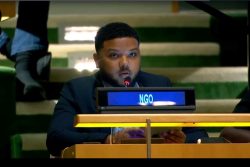In my first year at university, our lecturer was discussing post-colonial societies. We examined communist countries across the Caribbean, mid-democracies and dictatorial states He shared that in majority dictatorial countries, there is rarely any transition of leadership from a one-man or one-party rule. We were then asked to consider this reality in the context of Guyana, which at the time had enjoyed decades of unbroken leadership from the PPP/C.
As a baby feminist, who was now becoming more politically aware, I found this fascinating. Over the years, I’ve been looking at how this quasi-democratic state has been flexing its authoritarian arm. Regardless of what your ideology looked like in the beginning, being in power that long does something to you. It shapes your perception of what is possible, and as a power-holder, anything can be realized. First starting as a leftist-oriented party, centred on the principles of economic equity and collectivism, the PPP/C now firmly stands as a petit-capitalist machinery, with all the trappings of a 1984-esque state.
Their response to anything that does not shine a light on the positives of their rule, has historically been responded to with being put in their bad book and all that entails. They have been allowed to operate this way because ultimately, they believe their position in government to be secured – and why shouldn’t they? From our very first elections, Guyana’s voting patterns have largely remained unchanged along ethnic lines, ensuring the PPP/C’s victory consistently. The dream of a mighty third force is an illusory one, and the win the APNU+AFC coalition was able to secure by a small margin of five thousand, was not necessarily because of the hope of a nation. Largely it was due to old wounds the PPP/C inflicted on its voting bloc, who in turn stayed away from the polls.
In this increasingly modernizing world in which Guyana’s relevance is growing, the game to some extent has changed. There are more eyes on Guyana, which has not necessarily meant that the government’s response to criticism has changed, it has merely shifted to take on more insidious forms. Recent examples of this are seen through their approach towards media freedom, and their proposed amendments to the anti-money laundering bill.
Since their return to office, the government has been on brand in their messaging about the importance of press freedom. This talking point, however, never extends to actual respect for the media or ensuring their freedom to operate in an environment that is not hostile. Their idea of press freedom is a press that is free to praise them. There have been several examples of this over the past few months, with the most recent target being placed on the back of the Guyana Press Association. There is a clear strategy to replace its leadership with government sympathisers. With an embarrassing failure to do so, they now challenge the GPA as an institution itself. We should pay attention to this and the implications it has on the future of truth and democracy beyond the polls in Guyana.
The government’s proposed amendments to the anti-money laundering companion bill are also something to be cautious about. The government has a long history of being antagonistic towards civil society and its members. Only in the past few months, we have seen Bharrat Jagdeo attack activists and advocacy organisations such as the Amerindian Peoples Association, due to their criticisms of the carbon credits process and the lack of consultation for Indigenous communities. He has also not been shy about calling their supporters to fight against the “naysayers’’ (read as anyone critical of the government).
Under this proposed amendment to the bill, the government has the power to supervise and regulate the activities of non-governmental organisations. Including this into the framework of the anti-money laundering bill makes NGOs vulnerable to the government’s whims and tantrums, which we have seen, can be quite excessive and dangerous. NGOs are traditionally, often in opposition to the government and its harmful policies. Requiring them to be registered under the Commission or otherwise be considered not only invalid but in contravention of the laws of Guyana is a dangerous amendment that should not be passed. It will provide the government with power over civil society that it absolutely should not have.
In times such as these, the role of the media and civil society in holding the government accountable is even more important. The government’s move to de-tooth these institutions that are fundamental to democracy will not end well for the citizens of this country. There needs to be a shift from identity politics, towards politics that is critical of those we elect to serve us.








